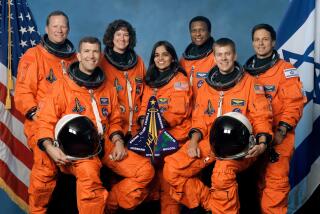Head of NASA Defends Staff as Conscientious
- Share via
WASHINGTON — The space agency’s acting administrator defended his agency’s employees Thursday as “extremely careful, extremely conscientious, extremely rigorous” and declined to second-guess the decision to launch the space shuttle Challenger on its doomed mission.
At a news conference called to reaffirm the Reagan Administration’s pledge to make a teacher the first ordinary citizen in space, William R. Graham refused to discuss specifics of the investigation into the Jan. 28 explosion that destroyed the Challenger and killed its seven crew members, including teacher Sharon Christa McAuliffe.
But Graham said he had not known until four days after the explosion that National Aeronautics and Space Agency documents dating to 1982 had raised concerns about the safety of the seals between segments of the shuttle’s solid boosters.
The possibility that the boosters’ seals failed has been the most investigated and discussed of the possible causes of the tragedy, largely because videotapes show a plume of flame at or near one of them before the explosion. But Graham, cautioning against jumping to the conclusion that the seal was at fault, said that investigators are looking at a range of possibilities. “We have not yet identified the primary problem,” he said.
No Second Guesses
When asked whether he would have canceled the launching if he had known about memos expressing concern about the safety of the seals, Graham said: “There is no simple way to answer that except to say I have a great deal of respect for the judgment and capability of the people involved. . . . I have no reason whatsoever to second-guess them.”
Graham became deputy administrator of the agency four months ago and was designated as acting administrator in December when James M. Beggs took leave to fight a criminal indictment in Los Angeles, where he is accused of defrauding the government on a Pentagon contract when he was an executive of General Dynamics Corp.
Employees ‘Careful’
The acting administrator said he had found NASA employees “to be extremely careful, extremely conscientious, extremely rigorous in technical and engineering and judgmental aspects.” Anyone watching launching preparations “would be impressed by them,” he said.
“From the benefit of hindsight, there is no one in NASA who would not have preferred not to have launched mission 51-L,” he said. “But, if you view it from the foresight they had at the time, they were acting carefully and as responsibly that they could have.”
Although Graham said that no timetable will be set for resuming shuttle flights until the cause of the accident is known and corrective steps are taken, he reaffirmed that “we’re going to continue with that commitment (to space education programs), and a teacher will be the first private citizen in space.”
He said he met Thursday with representatives of teacher organizations and some of the finalists in the competition that led to McAuliffe’s selection. “They are ready and eager to continue,” he said. “ . . . We welcome their deep and broad support. Space is our future.”
Next Teacher Named
Barbara Morgan of McCall, Ida., who was McAuliffe’s backup on the Challenger mission, will be given the next civilian opportunity to ride aboard a space shuttle, Graham said. She was not at the news conference but told reporters in Idaho that she still wants to fly in space. “We’ve got to push on,” she said.
The president of the National Education Assn., Mary Hatwood Futrell, told the news conference that NASA should “tolerate no retreat from its commitment to America’s students.” If it does not retreat, she said, “we will truly be able to say that, although Christa McAuliffe never reached her destination, her mission was accomplished.”
Meanwhile, the process of choosing the first journalist in space has been resumed, project organizers said. The 1,703 journalists who have applied for a space mission are being notified that review panels will begin meeting March 3 to start the selection process, said Jack Bass, public affairs coordinator for the journalist-in-space project. No applicants have asked that their names be withdrawn since the Challenger accident, project director Eric Johnson said.
More to Read
Sign up for Essential California
The most important California stories and recommendations in your inbox every morning.
You may occasionally receive promotional content from the Los Angeles Times.













